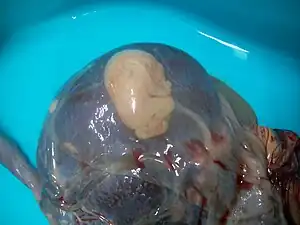Vanishing twin
A vanishing twin, also known as twin resorption, is a fetus in a multigestation pregnancy that dies in utero and is then partially or completely reabsorbed.[1][2] In some instances, the dead twin is compressed into a flattened, parchment-like state known as fetus papyraceus.[3]
| Vanishing twin | |
|---|---|
 | |
| A fetus papyraceus shown with its umbilical cord next to the placenta of its dichorionic diamniotic twin | |
| Specialty | Obstetrics and gynaecology |
Vanishing twins occur in up to one of every eight multifetus pregnancies and may not even be known in most cases.[4] "High resorption rates, which cannot be explained on the basis of the expected abortion rate, suggest intense fetal competition for space, nutrition, or other factors during early gestation, with frequent loss or resorption of the other twin(s)."[5]
According to Boklage, most twins are born as singles and vanished twins are a possible source of abnormal cells.[6]
In pregnancies achieved by in vitro fertilization, "it frequently happens that more than one amniotic sac can be seen in early pregnancy, whereas a few weeks later there is only one to be seen and the other has 'vanished'".[7]
See also
References
- Landy, Helain Jody; Weiner, Stuart; Corson, Stephen L.; Batzer, Frances R.; Bolognese, Ronald J. (July 1986). "The 'vanishing twin': ultrasonographic assessment of fetal disappearance in the first trimester" (PDF). American Journal of Obstetrics and Gynecology. 155 (1): 14–19. doi:10.1016/0002-9378(86)90068-2. PMID 3524235. S2CID 35698009.
- "Public Education Pamphlets". sogc.org. Retrieved 21 December 2017.
- Peleg, Dan; Ferber, Asaf; Orvieto, Raoul; Bar-Hava, Itai; Ben-Rafael, Zion (October 1998). "Single intrauterine fetal death (fetus papyraceus) due to uterine trauma in a twin pregnancy". European Journal of Obstetrics, Gynecology, and Reproductive Biology. 80 (2): 175–176. doi:10.1016/S0301-2115(98)00128-6. PMID 9846663. S2CID 21939913.
- Boklage CE (1995). "Chapter 4:The frequency and survivability of natural twin conceptions". In Keith LG, Papiernik E, Keith DM, Luke B (eds.). Multiple Pregnancy: Epidemiology, Gestation and Perinatal Outcome (1st ed.). New York: Taylor & Francis Group. pp. 41–42, 49. ISBN 978-1-85070-666-3. OCLC 32169252.
- Sulak, Laura Eve; Dodson, Melvin G. (December 1986). "The vanishing twin: pathologic confirmation of an ultrasonographic phenomenon". Obstetrics and Gynecology. 68 (6): 811–815. PMID 3537876. S2CID 68768784.
- Boklage, Charles E. (2006). "Embryogenesis of chimeras, twins and anterior midline asymmetries". Human Reproduction. 21 (3): 579–591. doi:10.1093/humrep/dei370.
- Jauniaux, Eric; Elkhazen, Nabih; Leroy, Fernand; Wilkin, Paul; Rodesch, Frederic; Justin, Jean (October 1988). "Clinical and morphologic aspects of the vanishing twin phenomenon". Obstetrics and Gynecology. 72 (4): 577–581. PMID 3047607. S2CID 42246785.
Further reading
- Landy HJ, Keith LG (1998). "The vanishing twin: a review". Human Reproduction Update. 4 (2): 177–183. doi:10.1093/humupd/4.2.177. PMID 9683354.
- Medland SE, Wright MJ, Geffen GM, Hay DA, Levy F, Martin NG, Duffy DL (April 2003). "Special twin environments, genetic influences and their effects on the handedness of twins and their siblings". Twin Research. 6 (2): 119–130. doi:10.1375/136905203321536245. PMID 12723998. S2CID 18780721.
- Pharoah PO, Price TS, Plomin R (September 2002). "Cerebral palsy in twins: a national study". Archives of Disease in Childhood. Fetal and Neonatal Edition. 87 (2): F122–F124. doi:10.1136/fn.87.2.F122. PMC 1721448. PMID 12193519.
(Online version required free registration)